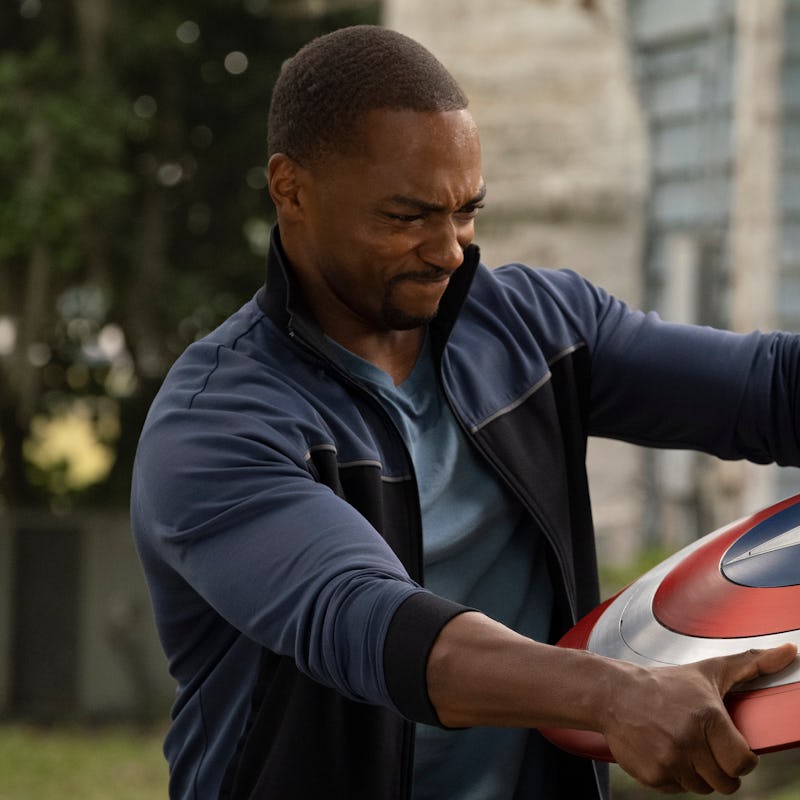Falcon and Winter Soldier just changed the entire MCU in 1 powerful way
By introducing Isaiah Bradley and John Walker, the MCU is turning the red and blue Captain America into a whitewashed golden calf.

In the shadow of Steve Rogers, a Brooklyn wimp who becomes Captain America after the injection of “Super Soldier” serum, there was Isaiah Bradley.
Written by Robert Morales and illustrated by Kyle Baker, Truth staged the first comic book appearance of Isaiah Bradley, a Black soldier in World War II also subjected to the serum. But while the formula was perfected on Rogers, testing continued on Black soldiers like Bradley, an expendable resource in the eyes of the U.S. military.
While hundreds of Black subjects died, Isaiah Bradley happened to survive, giving him powers equal to Captain America. But there was never recognition for Bradley. No parades, no comic books, no membership with the Avengers. Instead, Bradley was imprisoned for twelve years after going against orders and trying to take out Hitler on his own. Later, Bradley was pardoned by President Eisenhower.
Isaiah Bradley’s MCU moment
Anthony Mackie, in The Falcon and the Winter Soldier.
The metaphor Marvel went for was, to put it simply, that America was built on the sacrifices of Black people. The concept for Isaiah Bradley was inspired by the horrors of the real-life Tuskeegee Experiments, in which generations of African-American men were observed for untreated syphilis. The study went on for 40 years and caused the deaths of 128 Black men before a whistleblower leaked the study to Jean Heller of the Associated Press.
In The Falcon and the Winter Soldier, the blockbuster Marvel Cinematic Universe canonizes Isaiah’s story and, in a distant way, an institutional horror like Tuskeegee as well. The show’s second episode, “The Star-Spangled Man,” sports a title gesturing to John Walker, a gifted white Army grunt who is quite literally handed the shield of Captain America.
But the title really refers to Isaiah. Played with fury by actor Carl Lumbly (a superhero TV alum with credits in the animated Justice League and the live-action Supergirl), series protagonists Sam Wilson (Anthony Mackie) and Bucky Barnes (Sebastian Stan) meet Isaiah, an aging Black Korean War veteran living in a rough Baltimore neighborhood. Still possessing the powers of a Super Soldier, Isaiah is bitter for his “reward” of service: 30 years of prison, with daily tests and injections.
How Isaiah Bradley changes the MCU
With Sam’s surrender of the shield in The Falcon and the Winter Soldier, the government chooses John Walker (Wyatt Russell) to take up the shield instead.
Through Isaiah Bradley, The Falcon and the Winter Soldier introduces new, bleak depths to the MCU, a place already brimming with secrets and consequences to the presence of superheroes. If Bradley’s story is in any way similar to his comic origins as seen in Truth, then the MCU is on the verge of making the red, white, and blue Captain America into a whitewashed golden calf. Where Steve Rogers was the ideal underdog story who embodied America’s glory and promises, Isaiah Bradley is a lab rat who embodies America’s shame and lies.
But the center of The Falcon and the Winter Soldier isn’t Isaiah Bradley; it’s Sam Wilson. As the Falcon, Sam’s story is that of responsibility and, yes, representation. At the end of Avengers: Endgame, Steve Rogers gifted his friend Sam his shield, blessing him as the new Captain America. But between Endgame’s ending and Falcon and the Winter Soldier, Sam balked. To Sam, the identity of Captain America — a symbol and metaphor for America — held too much weight for his wings.
Out of his own fear and inadequacy, Sam surrendered the shield to the U.S. government for posterity. Little did he know what they would do with it, endowing a total rando the “new Captain America” just because he looks the part. (If there was ever a superhero to personify white privilege, it’s John Walker, played by Wyatt Russell who is sufficiently “nega-verse Chris Evans.”)
In his opening speech, Sam himself said: “Symbols are nothing without the women and men that give them meaning.” Even Captain America’s shield means nothing without “the man who propped it up.” Sam should listen to himself.
Sam is, in fact, good enough to be Captain America. As the Falcon, Sam took down a Hydra-controlled S.H.I.E.L.D., fought against the Sokovia Accords, went to war with aliens in Wakanda, and flew into the fight against Thanos. Sam is pretty worthy! But the guy is so caught up on symbols that he’s turned his own friend Steve Rogers into one. No one can be Steve Rogers, Sam believes. He’s right, no one can. But it’s not until Sam meets Isaiah, a literal Captain America who never got the catchy songs, the talkies, or a showgirl-studded national tour, that he doesn’t have to be Steve. He’s already Sam. Even as a Black man who can’t get a loan and is racially profiled by police, he too can be Captain America. He just needed to see it for himself.
The Falcon and the Winter Soldier streams Fridays on Disney+.
This article was originally published on